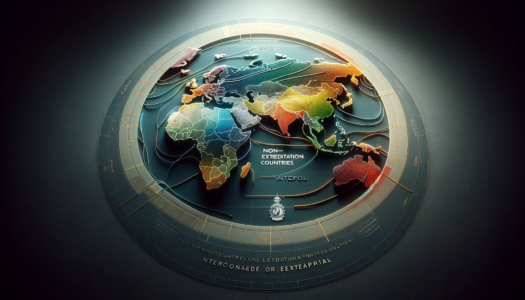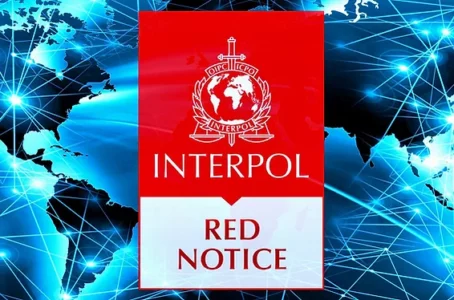Extradition Lawyers in the Philippines
In the Philippines, issuing a Hold Departure Order is a key tool used by courts to prevent individuals who have been charged with a criminal case from leaving the country. The extradition process in the Philippines requires utmost attention, as it can significantly alter a person’s life. Have you received a red notice from Interpol, an extradition request, or an international arrest warrant? Seek assistance from an experienced Interpol lawyer as soon as possible.
If you’re facing an extradition request in the Philippines, don’t risk your freedom and reputation. Our law firm specializes in extradition cases, including defending against unlawful requests and challenging Interpol red notices. We’ll provide thorough legal support at every stage, from case analysis to representing your interests in court.
What is Extradition?
Extradition is a legal procedure in which one country hands over an individual accused or convicted of a criminal offense to another country. The purpose of extradition is to ensure proper criminal accountability or the carrying out of a sentence if the suspect or convicted individual is outside the jurisdiction that initiated the case.
Extradition functions:
- Assistance in combating cross-border crime;
- Coordination of international cooperation in criminal prosecution and the execution of sentences;
- Ensuring the inevitability of punishment and eliminating the situation where a criminal can escape accountability in another country.
Extradition is provided for serious criminal offenses that are punishable by imprisonment for a term of not less than one year: murder, terrorism, drug trafficking, corruption, money laundering, and other grave acts. The main criterion is the principle of dual criminality, meaning the crime must be recognized as such in both states.
Extradition in the Philippines is governed by a combination of national laws, including relevant provisions of the Criminal Procedure Code and specific acts, as well as international treaties.
The process begins when a foreign government sends a formal official request for extradition of a suspect or convicted individual to the Philippines’ Department of Foreign Affairs.
The request includes official documents: an arrest warrant, a court decision, or a ruling on criminal charges. Also provided are evidence supporting the accusations and a description of the legal basis for the crime.
The Philippine Department of Foreign Affairs is verifying whether the request complies with existing extradition agreements and domestic law. If the request meets the formal criteria, the materials are forwarded to the Department of Justice.
The Department of Justice is conducting a detailed legal review: assessing the presence of the double jeopardy principle, verifying the accuracy of documents, and ensuring compliance with procedural norms. In the event of a positive conclusion regarding the admissibility of extradition, the case is transferred to the appropriate judicial body (regional or other competent court).
The judge reviews the arguments of the requesting country and the position of the person subject to extradition. They evaluate whether the evidence presented is sufficient for a preliminary ruling. If the charges appear to be well-founded, the court decides in favor of extradition.
If a court decides to extradite an individual, the parties involved have the right to appeal to higher authorities. The appellate process can take from several months to several years, depending on the complexity of the case.
In the absence of appeals or if appeals are rejected, the final decision is sent for approval to the President of the Philippines or to the authorized government body in accordance with local legislation.
If the government authorities make a final positive decision, the individual is handed over to representatives of a foreign state for further transportation to the requesting country.
Legal Basis for Extradition in the Philippines
Presidential Decree No. 1069 of 1977 is the primary national legislative act that defines the extradition procedure. It regulates the process for submitting a request, the requirements for such a request, and the stages of judicial hearings.
The Revised Rules of Criminal Procedure defines the general procedural norms applicable to the consideration of extradition cases in Philippine courts. Specifically, it establishes the rights and duties of the parties involved, as well as the requirements for evidence.
The Philippines is also a party to a number of extradition agreements and a participant in multilateral conventions that regulate issues of extradition and cooperation in the field of criminal law.
According to Philippine law, an extradition request must meet the following criteria:
- The act must be recognized as criminally liable in both states.
- A person cannot be extradited if they have already been convicted or acquitted for the same actions in the Philippines or in another jurisdiction.
- If the statute of limitations for criminal prosecution has expired in the requesting country or under the laws of the Philippines, extradition may be denied.
- Extradition should not be used as a tool for political pressure or persecution.
- The request will be denied if there is a risk of torture, inhumane treatment, unfair judicial proceedings, or the death penalty in the requesting country.
Courts assess whether the criminal prosecution is proportionate to the severity of the alleged crime and other factors (such as marital status, the amount of time that has passed since the crime was committed). If an individual has refugee or political asylum status in the Philippines, extradition becomes more complicated and often requires special consideration.
Bilateral Extradition Treaties
The Philippines is an active participant in international cooperation in the fight against crime, as evidenced by the signing of several bilateral extradition treaties. These agreements regulate the process of extraditing individuals suspected or accused of committing criminal offenses between the Philippines and other countries. They play a key role in ensuring justice at the international level by simplifying the extradition procedure and establishing clear rules for interaction between countries.
The Philippines has extradition treaties with Australia, Canada, the Federated States of Micronesia, Hong Kong, Indonesia, the Republic of Korea, Switzerland, the United States, and the Kingdom of Thailand. Additionally, it has mutual legal assistance treaties in criminal matters with Australia and the United States.
The requesting country is required to provide evidence confirming the existence of an arrest warrant or court decision regarding the person sought. It must also guarantee that the extradition does not violate human rights and will be used strictly within the framework of criminal proceedings.
The country that receives the request has the right to assess its justification, check for compliance with national legislation, and the terms of the agreement.
Non-extradition countries treaties with the Philippines
Non-Extradition Countries refer to nations with which the Philippines do not have official bilateral treaties or agreements on extradition. This means that the legal process of handing over a suspect or an individual accused of committing a crime can be significantly complicated or altogether impossible.
The Philippines does not have extradition treaties with the following countries:
- Argentina
- Bolivia
- Brazil;
- Venezuela;
- Vietnam;
- Guatemala;
- Egypt;
- Iran;
- India;
- Indonesia;
- Qatar;
- Lebanon;
- Malaysia;
- Morocco;
- Myanmar
- Nepal;
- Paraguay;
- Saudi Arabia;
- Syria;
- Taiwan.
However, extradition can still be carried out even in the absence of a formal treaty. States can enter into a one-time agreement to extradite a specific individual. If countries are participants in multilateral conventions, they can also use its provisions to extradite individuals.
In the absence of a formal agreement, countries can conduct direct negotiations at the diplomatic level. In some cases, one country may agree to extradition based on the principle of reciprocity, assuming that assistance will also be provided to the other party in the future.
What is an Interpol Red Notice?
An Interpol Red Notice is an electronic alert distributed by the International Criminal Police Organization among all member countries, indicating that a person wanted for prosecution should be located and, if possible, detained for extradition or other legal proceedings.
However, a Red Notice does not carry the power of an international arrest warrant. It is not in itself a mandatory legal document. Each country decides independently whether to detain a person or not, based on its own laws and international obligations.
Main functions of the red alert/notification:
- Notification to national law enforcement agencies about the search for individuals.
- Assisting in the detention during the identification of a wanted individual at the border or during document checks.
- Simplifying the exchange of information between countries and coordinating their actions in pursuing individuals evading justice.
In an Interpol Red Notice, the following information is contained:
- Identification information: full name, date and place of birth, citizenship, distinguishing features, photographs;
- Legal basis for the search: national arrest warrant, court order for detention, and other supporting documents.
- Criminal charges and a brief description of the crime: what exactly the person is accused of, under which laws, and the severity of the alleged act;
- Information about the requesting country: contact details of the law enforcement agency that initiated the notification;
- Additional information: known addresses, contacts, vehicles used, possible routes of movement.
Just like any other legal mechanism, an Interpol Red Notice can be challenged on the following grounds:
- Persecution for political, religious, military, or racial reasons;
- The allegations are not supported by sufficient factual evidence.
- Mistaken identity (the person became a subject of a search due to data confusion or a name coincidence);
- Risk of torture, unfair trial, or application of the death penalty;
- In the requesting country, the case has been closed, the statute of limitations has expired, or the charges have been dropped.
If you are in the Philippines or planning to enter the country, and there’s a red notice against you, it’s crucial to first consult with an international criminal law specialist. A lawyer will help gather evidence and build a strong argument.
When someone comes to the attention of the Philippine law enforcement agencies, they are informed about the existence of a red notice. It’s important to find out which agency made the request, what the grounds are, and what evidence has been provided.
A lawyer can file a motion in court to challenge or cancel any actions related to a red notice. The local court may find the notice to be non-compliant with Philippine laws or may authorize further extradition.
At the same time, the lawyer submits a request to the CCF demanding a review or cancellation of the notice. The document package includes evidence of violations, information on the lack of sufficient evidence, and other supporting materials. The Commission for the Control of Interpol’s Files evaluates the applicant’s arguments. If the notice is found to violate Interpol’s constitution, it is removed from the database.
If the outcome is positive, the red notice will be removed or revoked, and the individual will not face difficulties when crossing borders or interacting with Philippine authorities.
If a petition is rejected in court or if the CCF issues a negative decision, it’s possible to reapply if new evidence emerges or to appeal the decision in higher instances.
Legal Assistance with Extradition in the Philippines
Extradition cases are complex and multi-stage legal procedures. Without skilled legal support, there’s a high risk of violating rights and freedoms, as well as the possibility of being wrongfully subjected to criminal liability. Therefore, it’s crucial to seek out professional lawyers who specialize in international criminal law and are familiar with the specifics of the Philippine legal system.
At the initial consultation, our Interpol’s lawyers will analyze your documents, identify all the details and risks, and also help develop an effective defense strategy. We develop a legal position, compile a package of evidence, and assist in preparing procedural documents for Philippine courts or the Interpol Files Control Commission.
Our attorneys accompany the client at every stage—from the preliminary detention hearings to the final court decision on extradition.
When necessary, we reach out to Interpol with a request to cancel or adjust a red notice, citing the political nature of the case, identification errors, or non-compliance with Interpol’s constitution. In the event of a court’s refusal or other negative decisions, we develop a plan for further actions, up to and including appeals and reaching out to international bodies.
Our lawyers provide the following services to clients:
- Comprehensive audit of the case, assessment of prospects and risks;
- Consultation on issues of international criminal law;
- Preparing documentation for Philippine courts and Interpol agencies;
- Legal support for extradition procedures and related hearings;
- Challenging red notices and interacting with Interpol’s CCF (Commission for the Control of Interpol’s Files);
- Appellate and cassation support.
Contact us right now for an initial consultation and to discuss the next steps for protecting your interests. Our team is ready to defend your rights and protect you from unlawful persecution, using our full arsenal of knowledge and practical experience in the field of international criminal law.









